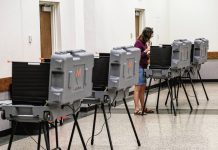(TERRE HAUTE) TRIBUNE-STAR
Candidates for Indiana governor — Libertarian Rex Bell, Democrat John Gregg and Republican Eric Holcomb — were asked a series of questions on some of the major education issues in Indiana.
Those issues include pre-kindergarten, the teacher shortage, an alternative to ISTEP, private school vouchers and their approach to working with a state superintendent of public instruction elected from a different political party.
Candidates answered questions by email. Answers are presented in alphabetical order by candidate’s last name.
[sc:text-divider text-divider-title=”Story continues below gallery” ]
Do you support universal expansion of pre-K, making it available to all children? How would you pay for any expansion of pre-K?
Bell: No, I do not support a state-controlled pre-K program. There are many churches and private organizations that offer pre-school programs if people need help with their younger children. Family support is the greatest contributor to success in continuing education, and as a society we should be working to enable and encourage more family involvement and less government intervention in our children’s education.
Gregg: Yes, and I am the only candidate that has a plan to do it. Forty-two other states already offer pre-K and Indiana should join them. My plan calls for statewide, yet optional, pre-K, for all 4-year-olds, which would cost about $150 million per year. Funding for this can be found by re-purposing existing state tax dollars, which are going unused, and awarding grants to school districts that partner with public/private providers to implement high-quality programs. I will also seek the federal dollars that the Pence/Holcomb administration turned away. We can accomplish this without raising taxes.
Holcomb: I wholeheartedly support an expansion of Indiana’s first-ever, state-funded pre-K program — first to those who have the greatest financial need because the true cost comes in not addressing this issue. To fund that responsible expansion, we should continue to leverage all sources of revenue, including federal, state, local and private, while maintaining autonomy.
There is a serious teacher shortage in Indiana. As governor, how would you respond to the problem and encourage more people to go into education?
Bell: We could go a long way in addressing the teacher shortage by removing federal and state interventions from local schools, and allowing teachers to simply do their jobs.
Gregg: As governor, my administration will address the teacher shortage through recruitment and retention efforts. The first step should be to give teachers a seat at the policy-making table – and stop the intentional excluding and undermining them. Their experience in the classroom should be respected and listened to when policy makers are making education decisions. As governor, I will also support Superintendent (Glenda) Ritz’s efforts to provide professional development and National Board Certification for teachers, and her efforts to create a bipartisan commission to give educators a voice in solving the teacher shortage.
Holcomb: This challenge is not unique to Indiana. So, we have to ask ourselves, how do we best support our best teachers and encourage more to pursue this prestigious profession here in Indiana? The answer, I believe, is to treat teachers as the professionals they are, equip educators with the resources and autonomy they need to succeed in the classroom, compensate our outstanding teachers in a manner that incentivizes them to stay in the classroom, ensures teachers are a part of the policy conversation and provide scholarships for aspiring teachers going to college.
The ISTEP exam will be eliminated as of July 1, 2017, and the state must find an alternative. There has been much concern about the cost and time involved with the current ISTEP. What changes need to occur and what type of alternative assessment would you support?
Bell: I am in favor of allowing parents, teachers, and local school boards to decide on the type and level of testing their students should receive.
Gregg: A Gregg/Hale administration will work with the General Assembly and the Superintendent of Public Instruction to implement a new state student-centered testing system for the purpose of improving teaching and learning. Part of improving testing is also reforming how we measure school performance. Indiana needs a school performance system that accurately depicts school improvement based on a range of factors, not just one flawed test, while still ensuring accountability. Indiana is one of only 15 states that use an A-F school grading system, putting us behind on implementing a more comprehensive, accurate school performance system.
Holcomb: First off, ISTEP is going away and can’t go soon enough. ISTEP was counterproductive because it forced teachers to teach to the test and at times caused students to lose interest in actual learning. Moving forward, we need to replace it with a test that is fair and accurate, and gets results back quicker so that those results are meaningful to students, parents and schools.
What is your position on private school vouchers and should it continue to be expanded?
Bell: We should continue to encourage parental choice in education, while keeping in mind there are new and innovative approaches to education being developed every day. Rather than promoting one type of school or education system over another, we should encourage alternative forms of education, with education dollars following the student to the school of their parents’ choice.
Gregg: Vouchers should not be expanded any further in Indiana, as we already have the largest voucher system in the country. With that said, I believe those families already receiving vouchers should continue to receive them. The state of Indiana has made a commitment to those families and we should not break it.
Holcomb: I believe in the freedom of parents to choose where they send their child. Just like it’s the parent’s decision to buy a new house, or a buy a new car, or buy a Coke, or where to get a haircut, they should be able to choose the educational environment that best meets their child’s needs. Therefore, the state should work to meet the demands of those families and students, particularly those who are the most disadvantaged, who seek to take advantage of the options others have due to financial means.
What would your approach be to working with a state superintendent of the opposite party? There has been much conflict between the Democratic state superintendent and Republican governor in recent years.
Bell: Lessening the role state government plays in education would remove much of the conflict that exists between the superintendent and the governor. Our eventual goal should be elimination of that position above a local level.
Gregg: As I have done throughout my career, I will work with anyone to who is willing to work with me. I do not believe in Democrat, Republican or independent ideas — only good and bad ideas. My administration will be built upon that foundation and I will actively seek input from the state superintendent, no matter their political affiliation. It will be a relationship of respect, inclusivity and collaboration. Education policy decisions should begin and end with students at the center, not politics.
Holcomb: My entire time in public service has been spent bringing people with different ideas and opinions together to do big things. In fact, I want people at the table who disagree with me. That’s why I’m willing to talk to anyone and everyone in the state who has a serious interest in improving outcomes even if they have a different opinion. I believe Dr. Jennifer McCormick is overly qualified having been a teacher, principal and now superintendent and that she is ready to lead as our next superintendent of public instruction, but I will not hesitate to work with anyone.




